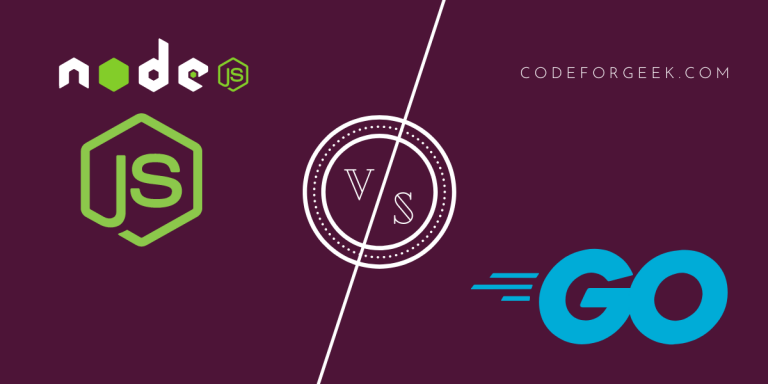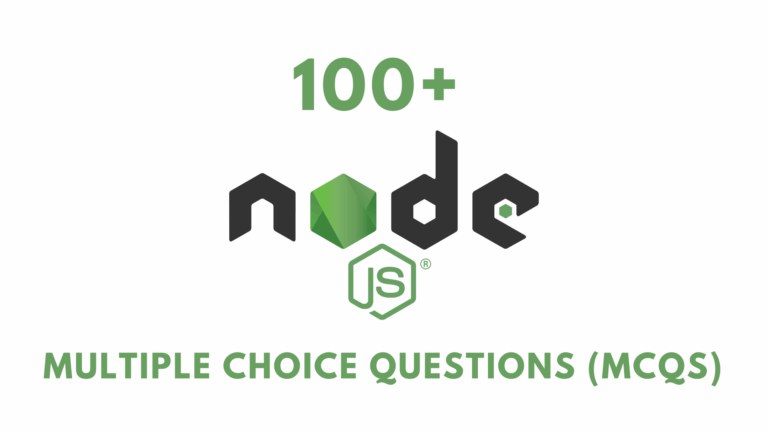New to Rust? Grab our free Rust for Beginners eBook Get it free →
Nodejs vs Go: Comparative Guide to Choosing the Best Backend Technology in 2021

This is yet another comparison guide of Nodejs. Today it’s the fight between Nodejs vs Go Language.
If you want to read a comparison guide between Nodejs vs Python or Nodejs vs PHP, you can click the links.
Modern-day developers have a wide range of programming language options to choose from when it comes to backend web development, to be specific. There are many powerful languages with their own unique features out there to help achieve a variety of objectives.
A web application has two parts to it: the front end and the back end. The front-end efforts are what the users see and it is just the part of the equation. However, the backend is where the heart of the application lies. Your application basically lives on the backend. If that’s messed up, everything breaks unless you don’t have error handlers set.
This is exactly what spices up the battle of Nodejs vs Go.
Nodejs is a competent backend JavaScript framework today and has stood in competition with many popular programming languages and frameworks.
Google’s Go language also has dominant features which makes it competitive enough.
Today’s tutorial on Nodejs vs Go language is a comparison between two relatively new technologies for choosing the best backend.
Of course, as a matter of fact, there are no such better or worse applications. However, it apparently depends on what your web application demands.
Nodejs vs Go Language: Synopsis
Nodejs is an open-source JavaScript runtime built on Chrome’s V8 engine founded by Ryan Dahl in 2009. It has a non-blocking I/O architecture which makes apps highly scalable, fast, and lightweight.
It has extended the limits of JavaScript and changed the use of JS on the server-side. Popular apps like Trello, Linked In & Netflix use Nodejs.
On the other hand, Go or Golang is also an open-source statically-typed multipurpose language built by Google in 2007. It is power-packed with performance and security advantages of C/C++ and the speed of Python.
It has a strong structure and is effective for handling concurrent programming. Although not recommended for the web, it is great for cloud-based applications, real-time application development, microservices, and more.
Now that we have our basics in place for both languages, it is time to get started with the ultimate Nodejs vs Go fight and settle down the debate!
Nodejs vs Go: In-depth Comparison

It is now time to settle the debate and come up with an answer. To get accurate results, we must study at least one criterion. As we look forward to making a crucial decision of selecting the best technology for the backend, we will consider multiple criteria to arrive at a decision.
Syntax & Learning Curve
The word ‘syntax’ refers to the statement structure of sets of functions in a programming language. The simpler the syntax, the flatter the learning curve, which means you are able to learn the programming language faster.
Nodejs
For a newbie, JavaScript and Nodejs are easier to learn and adapt to. As the reason, it is a more widely-used programming language. The syntaxes are easier to comprehend.
Also, there are more courses on the internet for Node.js when compared to Go. It is faster to become a master in Node.js when compared to Go, and it also supports both frontend and backend development.
Go
Go language learners are required to learn Go-specific concepts, processes, rules, pointers, strict typing, interfaces, coroutines, and several other stuff. This means if you plan to hire a Go developer for your web application, you must know the language prior.
Also, Go is only built for the backend so you would have to hire frontend developers separately.
Winner: Nodejs
Community
For any technology, a community is of the essence today. A community refers to the users and developers that use the technology. Members in a community help other developers (and non-developers too sometimes) solve issues or contribute to the technology.
Active members keep updating popular projects and libraries, add new features and do a lot more!
Nodejs
Some of you who aren’t much familiar with Nodejs might be under the impression that Node.js is quite recent, and presume its community to be small. Well, you’d be surprised to learn that Nodejs has a vast and globally active community with experienced members!
Also, top-tier companies like Intel, IBM, Paypal, Microsoft, and Godaddy are Node Foundation’s active members.
As of 2018, Nodejs package downloads crossed the 1 billion mark.
Go
As mentioned in the beginning, both the technologies are open-source. Although its community is quite nascent, it is increasingly growing every year.
However, it is also important to note that Go is 2 years older than Nodejs. Comparing the progress, Go loses the battle here.
Winner: Node.js
Performance
A technology’s architecture and features impact the speed and performance of the applications made out of them. The better the speed and performance a technology serves, the higher chances for its win!
The comparison will help us know the winners of the Nodejs vs Go fight.
Nodejs
Node.js is built on a non-blocking architecture that makes the execution process simpler and faster. To top it all off, the code is run outside the web browser.
The web application is able to run faster and perform better in a more efficient way. This enables the web application to use features like TCP sockets, which are otherwise unavailable in browsers.
Moreover, Node.js’ single module caching feature makes applications run faster and responsive.
Go
Google’s main objective to build Go was to tackle the performance issues with web applications. The Go framework performance of the CPU is comparatively much lighter and faster. In these areas, Nodejs can prove to be terrible depending on what your app demands.
However, when considering database interactions and network communication, Node and Go have equal performance.
Winner: Go
Libraries & Tools
Libraries help developers use a code for any operation, without having to recreate it all by themselves, from scratch. Frameworks, libraries, and packages are the way any technology gains popularity, features, and capabilities.
With help of a library, all you need to do is simply add code to your project and modify it as per your needs. Let us see who wins this round of the Nodejs vs Go battle!
Nodejs
Node is flourished with new, powerful, and up-to-date tools which already proves a win. It offers tools for every type of development task. With the added support of the vast community Nodejs has, it only makes it more unbeatable.
Go
Since Go is new and still developing, it hasn’t gained much popularity yet amongst devs. Although it offers a few decent tools, developers planning to “master” Go would need to undergo too much research and manual configurations which is very much time-consuming.
Winner: Nodejs
Conclusion
This is yet another comparison guide of Nodejs. Today it’s the fight between Nodejs vs Go Language. Today’s tutorial is a comparison between two relatively new technologies for choosing the best backend.




